|
|
|
|
|
|
|
|
|
 Posted: Thu Feb 17, 2011 2:19 am Posted: Thu Feb 17, 2011 2:19 am
Greetings fellow drow enthusiasts. If you are here, it is clearly to learn more about the potential Classes available to your Underdark character. Please, if you have any questions, feel free to PM the mule for an answer.
Classes are important in this shop, as they allow others and yourself to understand what your character is capable of. Typically, first stage characters are the 'weakest' out of all the stages. Excluding Legendary characters of course. Once you succeed in achieving the final stage of your characters development you may choose to have your character Cross Class with another common class available (Or a Rare class in the case of Legendary Characters), or you may choose to have them pursue a Prestige Class in accordance to their Primary.
Much of the information provided below is from the D&D books provided by Wizards of the Coast. Information is taken from the 3.5 Edition books, or older in some cases.
Please note that some Classes are restricted to Legendary or Rare status! Use the following code to determine if your chosen class falls within these specs:
C Stands for Common Class. A Common class can be chosen by any rank character.
R Stands for Rare Class. A Rare class can only be chosen if you have the rank for it. Rare classes are typically auction or custom available only.
L Stands for Legendary Class. A Legendary class can only be chosen if you have the rank for it. Legendary classes are typically auction or custom available only.
|
 |
 |
|
|
|
|
|
|
|
|
|
|
|
|
 Posted: Thu Feb 17, 2011 2:24 am Posted: Thu Feb 17, 2011 2:24 am
Sargtlin
The Warrior Class Fighter 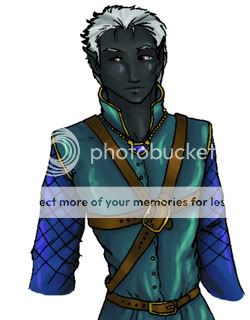 C Class C Class The questing knight, the conquering overlord, the king’s champion, the elite foot soldier, the hardened mercenary, and the bandit king— all are fighters. Fighters can be stalwart defenders of those in need, cruel marauders, or gutsy adventurers. Some are among the land’s best souls, willing to face death for the greater good. Others are among the worst, with no qualms about killing for private gain, or even for sport. Fighters who are not actively adventuring may be soldiers, guards, bodyguards, champions, or criminal enforcers. Most fighters see adventures, raids, and dangerous missions as their job. Some have patrons who pay them regularly. Others prefer to live like prospectors, taking great risks in hopes of the big haul. Some fighters are more civic-minded and use their combat skills to protect endangered people who cannot defend themselves. Whatever their initial motivations, however, fighters often wind up living for the thrill of combat and adventure. Of all classes, fighters have the best all-around fighting capabilities (hence the name). Fighters are familiar with all the standard weapons and armors. In addition to general fighting prowess, each fighter develops particular specialties of his own. A given fighter may be especially capable with certain weapons, another might be trained to execute specific fancy maneuvers. As fighters gain experience, they get more opportunities to develop their fighting skills. Thanks to their focus on combat maneuvers, they can master the most difficult ones relatively quickly. prowess, each fighter develops particular specialties of his own. A given fighter may be especially capable with certain weapons, another might be trained to execute specific fancy maneuvers. As fighters gain experience, they get more opportunities to develop their fighting skills. Thanks to their focus on combat maneuvers, they can master the most difficult ones relatively quickly. Raider 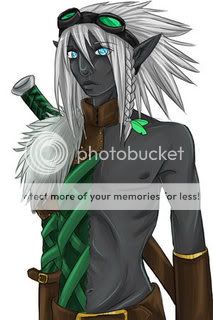 R Class R ClassThese warriors are desensitized to the light of the surface world. Working under a female commander to conduct reconnaissance missions and organized attacks on the surface elves and any other surface creature that gets in their way. Surface Raiders fall into multiple categories for class. The one currently described here is one who makes up the bulk of the raiding army. Warrior Raiders are trained to be quick and effective in their assault. They are taught about the strangeness of the surface, and if they manage to survive a few years worth of trips above, they can become exceptional in their job. Bounty Hunter  C Class C ClassLocal lords call upon bounty hunters to capture criminals that live or have traveled beyond their reach or criminals that outclass the knights or soldiers in the lords employ. Closer to the frontier, the bounty hunter might be the only law capable of bringing dangerous criminals to justice. Those who hire bounty hunters both like them, and scorn them. Evil bounty hunters might seek to recapture the innocent or bring selected captives to cult leaders as sacrifices. They might belong to these cults, or work for pay. Evil bounty hunters might also hunt down good adventurers in the name of evil forces. Bounty hunters are relentless in their pursuit of good or evil. Once given a task they will stop at nothing to accomplish their mission, no matter the difficulty of their apprehension. They can sense when their prey is near and become obsessed and focused on their victim. They also gain amazing speed when in pursuit of their prey and are masters of tracking, stealth and traps. Bounty hunters must be any non-chaotic alignment. This non-chaotic nature does not represent that the Bounty hunters must follow the law of the land, but rather they all must follow a higher cause, and a higher law the hunters creed... Bounty hunters are proficient with all simple and martial weapons as well as with a Sai, Whip, Hand Crossbow, all repeating crossbows and Net. Bounty hunters are proficient with light and medium armors and with bucklers but not any other shields. Bounty hunters must follow a code of ethics called The Hunter's Creed, sometimes just referred to as The Creed. The Hunter's Creed is a series of beliefs set forward by the first Bounty hunters and is still followed to this day. The Bounty hunter must follow The Creed at all times (See Ex-Bounty hunters below). - People Don’t Have Bounties, Only Quarries Have Bounties: This single, cardinal rule, more that any other, defines the way in which Bounty hunters approach their chosen profession. It reflects the idea that sapient beings, to some degree, must be accorded respect. If, however, an individual has a bounty placed on them, he or she ceases to be an individual with rights. No longer a member of the galactic community, the "quarry" becomes fair game. Tears should never be shed over the fate of someone who is after all... "Only a quarry." - Capture By Design, Kill By Necessity: In keeping with the loosely defined Hunter code of ethics, killing is sometimes necessary. That’s business, pure and simple. However, unnecessary killing is still murder. The Bounty hunter, unless otherwise directed by those leveling the bounty, must attempt to deliver the quarry alive. Often those leveling the bounty have a vested interest in a live target - and the target might be better off trying to get killed by the Bounty hunter. - No hunter Shall Slay Another hunter: Simply put, no matter their origin Bounty hunters see themselves as a special breed. They take their lives (and those of others) into their hands each time they hunt. One may agree with another hunters motives, or damn him for the manner in which they carry out their hunts, but no Bounty hunter may ever knowingly take up arms against a fellow hunter. This law applies only to hunters who themselves follow the creed. Those whom have broken the creed, or those that have a bounty posted on their head are merely quarries. In such cases the ex-hunter is no longer seen as a member of the common fellowship and old scores can now be settled with impunity. The hunter has become the hunted. - No hunter Shall Interfere With Another's Hunt: While it is not unheard of for Bounty hunters to work together as a team, the hunt for a given quarry is most often viewed as a form of personal duel between two sapient creatures. In such a duel the hunter matches skills, wit and courage against all the resources that one's opponent can bring to bear. If the hunter wins it is a personal triumph denoting superior skill and intellect, not simply a question of luck. To interfere in another’s hunt, unless first invited is to leave the question of "who is better" open and perhaps forever, unresolved. Of course competition between hunters is often fierce and there is often a very thin line between "compensation" and "interference." This being true, while a Bounty hunter is constrained from taking direct action against another hunter, there is nothing to constrain a Bounty hunter from hiring others to do the dirty work. Of course if such an action, successful or not, can be traced back to the original perpetrator serious consequences inevitably follow. - In The Hunt One Captures Or Kills, Never Both: In the case where the quarry has been taken alive, that "choice" cannot be altered. To kill a quarry in the course of the hunt is one thing, but to purposely kill an unarmed, helpless being already subdued and unable to resist is seen as simple slaughter and wanton butchery. A quarry "killed while trying to escape" however, would be an entirely different matter altogether. - No hunter Shall Refuse Aid To Another hunter: While no hunter has the right to interfere in another’s hunt, there comes times when even the best among master Bounty hunters require assistance. In extreme cases any hunter may ask and expect to receive aid and assistance from another hunter, even if it means the latter must temporarily suspend his or her own hunt in the mean time to render such aid. Whatever personal grievances or animosities may be involved between the two parties, it is known and understood that Bounty hunters take care of their own. Of course such assistance is not without a price tag, and the arbitration of payment after the fact can often put a substantial dent in the requesting Bounty hunters expected profit. Ex-Bounty hunters:A Bounty hunter who becomes chaotic in alignment or grossly violates the Hunter's Creed loses credibility.He may not find work as a Bounty hunter. He regains his credibility and advancement potential if he makes amends for his violations as appropriate, preferably with the be-grieved party, but if that is not possible (either there is no party to make amends to, or the party in question wants nothing to do with forgiving the Bounty hunter), than with the atonement from a cleric of their deity.
|
 |
 |
|
|
|
|
|
|
|
|
|
|
|
|
|
|
|
 Posted: Thu Feb 17, 2011 2:25 am Posted: Thu Feb 17, 2011 2:25 am
Shebali
The Thief Class Rouge 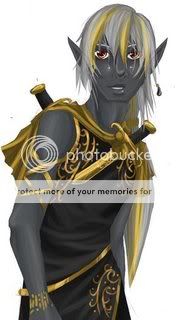 C Class C Class Rogues share little in common with each other. Some are stealthy thieves. Others are silver-tongued tricksters. Still others are scouts, infiltrators, spies, diplomats, or thugs. What they share is versatility, adaptability, and resourcefulness. In general, rogues are skilled at getting what others don’t want them to get: entrance into a locked treasure vault, safe passage past a deadly trap, secret battle plans, a guard’s trust, or some random person’s pocket money. Rogues adventure for the same reason they do most things: to get what they can get. Some are after loot; others want experience. Some crave fame; others seek infamy. Quite a few also enjoy a challenge. Figuring out how to thwart a trap or avoid an alarm is great fun for many rogues. Rogues are highly skilled, and they can concentrate on developing any of several categories of skills. While not equal to members of many other classes in combat, a rogue knows how to hit where it hurts, and she can dish out a lot of damage with a sneak attack. Rogues have a sixth sense when it comes to avoiding danger. Experienced rogues develop mystical powers and skills as they master the arts of stealth, evasion, and sneak attacks. In addition, while not capable of casting spells on their own, rogues can “fake it” well enough to cast spells from scrolls, activate wands, and use just about any other magic item. Some rogues are officially inducted into an organized fellowship of rogues or “guild of thieves.” Some are selftaught; others learned their skills from independent mentors. Often, an experienced rogue needs an assistant for scams, second-story jobs, or just for watching her back. She recruits a likely youngster, who then learns the skills of the trade on the job. Eventually, the trainee is ready to move on, perhaps because the mentor has run afoul of the law, or perhaps because the trainee has double-crossed her mentor and needs some “space.” Rogues do not see each other as fellows unless they happen to be members of the same guild or students of the same mentor. In fact, rogues trust other rogues less than they trust anyone else. They’re no fools. Raider  R Class R ClassMost surface raiders must dress in thick robes with veils or protective goggles to guard against the light of the surface world. They either follow the Surface Raider armies to scavenge sellable goods or conduct surprise robberies on unsuspecting surface villages. Con Artist  C Class C ClassBright and colorful or shadowy with a crooked smile, those are the typical descriptions of a Con Artist. Many specialize in a variety of skills, each honed for one motto: You can fool some of the people, all of the time. Con Artists rarely answer the call of adventure unless things have gotten too dangerous in their normal haunts. People catch on quickly when things start to go missing or you've cheated them one too many times. But when they do, they are far from hapless individuals. A true Rogue at heart the Con Artist makes up for their lack in physical strength with sheer brilliance and a slippery silver tongue. They can easily talk their way out of just about any situation their sixth sense for danger failed to warn them about. If talking isn't an option well, no one can flee as quickly as the Con Artist can. Experienced Con Artists have multiple tricks up their sleeves, from the ability to pick pockets to rigging games, to know when to subtly collect information to sell later. One trick they've learned is to create false thoughts that a mind reader can pick up, as well as the ability to project false loyalty to a person, house, or deity. A side bonus to having trained their minds to absorb information in such a way as to make it easier for them to recall quickly, they've gained an ability that lets them blank their mind at will, rendering any sort of mind reading null. Spies  C Class C ClassA spy is a thief specializing in information. Any society has secrets, and there are always people who want to find these secrets out. A spy gets the information and finds uses for it, selling it, using it for blackmail, or releasing it to the public. You could say that the spy is a rogue specializing in opening hearts and minds instead of locks. As society becomes more complex, additional ways of hiding information becomes available, and the spy must master them all, in order to defeat them. Thus the old adage; you need a spy to catch a spy. Spies are most often rogues, but bards can also excel at the profession, while the other classes find spycraft hard to learn. Spies in more organized societies usually band together in the service of some powerful organization. But there are always freelance spies, fortune hunters, thrill seekers and other chaotic elements in the business. Every Matron of note has a Spy Master in her employ. Either one raised within her own House, or one that she pays to keep her informed of the whispering going on's outside her House walls. Assassin  C Class C Class Assassins kill instantly and in secret, their favorite weapons being the dagger and the poisoned dart. They will persue any target, for the right price that is. Some assassins may be found in the permanent employ of a House. After all, every good Matron has at least one trained assassin on hand for those troublesome upstarts pestering them. Poisoner  C Class C ClassYour training has focused on the use of poison, the hidden art of death, immobilization, pain, sleep, or some magical effects to wipe your target from the face of the earth. Useful in combat or subtle sleights of hand in a person’s drink, there are any number of ways for you to kill your mark. A Poisoner is an Assassin that specializes and solely practices the art of a silent death caused by toxins. Not all of them prefer a quick, painless kill. Instead they choose to administer a poison that is slow to act and hard to counter. They practice their trade in secret, normally under the guise of a Bard, Spy, or Assassin. They will pursue any target, for the right price that is. Some poisoners may be found in a guild, or in the employ of a House, but many work freelance. After all, it takes a poisoner to route out an others work and it's best not to be in a place where your reputation will precede you. Bard R ClassIt is said that music has a special magic, and the bard proves that saying true. Wandering across the land, gathering lore, telling stories, working magic with his music, and living on the gratitude of his audience—such is the life of a bard. When chance or opportunity draws them into a conflict, bards serve as diplomats, negotiators, messengers, scouts, and spies. A bard’s magic comes from the heart. If his heart is good, a bard brings hope and courage to the downtrodden and uses his tricks, music, and magic to thwart the schemes of evildoers. If the nobles of the land are corrupt, the good bard is an enemy of the state, cunningly evading capture and raising the spirits of the oppressed. But music can spring from an evil heart as well. Evil bards forego blatant violence in favor of manipulation, holding sway over the hearts and minds of others and taking what enraptured audiences “willingly” give.
|
 |
 |
|
|
|
|
|
|
|
|
|
|
|
|
 Posted: Thu Feb 17, 2011 2:31 am Posted: Thu Feb 17, 2011 2:31 am
El'faeruk
The Spell Caster Class Elemental/ Evoker  C Class C Class An evocation spell creates an effect out of thin air. The effect could blind its targets with searing light, immolate them with explosive fire, or shock them with electrical current. Specialists in this school call themselves evokers, and they subscribe to the philosophy that the best defense is a strong offense. Those who oppose the school of evocation cite the collateral damage of these spells, but evokers are quick to assure any concerned party that their spells are either carefully timed or highly precise. In truth, evokers are almost fatalistically drawn to the limitless raw magical power of their spells, oblivious to the inherent danger. Evokers see their school as a highly necessary one that focuses magic from its most turbulent and volatile state. Pure magical energy would, if left unchecked, deal far more damage to the world if evokers didn't regularly harness and release it in controlled amounts. Opponents of the school, who believe that evokers contribute to rather than diminish the chaotic state of raw magic and therefore destabilize magic for all spellcasters, dismiss this theory. Philosophically, evokers are opposed to the school of conjuration, since that school focuses on creating lasting or tangible effects. Evokers regard the reality-based focus of conjurers as limited in its outlook, missing the wealth of opportunities that evocation creates. By extension, the school of enchantment warrants a delicate touch that is frequently lost on evokers. Abjuration magic tries to pro tect against evocation spells, but is usually considered just another hurdle to be overcome. Necromancer  C Class C Class Necromancy spells hold dominion over life and death. Their effects can drain the stamina out of an opponent's body, exert control over the undead, or instill paralyzing fear in a creature's mind. Specialists in this school call themselves necromancers, and they subscribe to the philosophy of waste not, want not. Detractors of the school condemn necromancers' practices as abhorrent and disrespectful to the dead, but necromancers defend their art on the premise that the dead care very little for their bodies, especially if they can be put to good use. Controlling such bodies, however, is secondary to controlling life. To a necromancer, magic is based on the idea that life is an essential element in the universe—one that can be controlled and manipulated just as matter and energy can be. Necromancers believe that they hold the reins of life by surrounding themselves with undead creatures. People who challenge the necessity of this school claim that necromancy weakens the barriers between the dead and living realms, causing the two to encroach upon one another more each day. Philosophically, necromancy is opposed to the school of enchantment, which claims supremacy over the mind. Necromancy trumps the mind by claiming dominion over life. Necromancy also finds little in common with conjuration; while conjurers must create their own power by summoning and the like, necromancers work with whatever is on hand at the time. Illusionist  C Class C Class An illusion spell creates a false impression that targets the senses. The effect could hide your presence, summon a target's greatest fear, or manifest a visage limited only by your creativity. Specialists in this school call themselves illusionists, and they subscribe to the philosophy that reality is only what you make of it. Critics of the illusion school claim that its spells erode an earthly sense of stability, using smoke and mirrors to incite chaos and misdirection, but illusionists maintain that earthly stability has never really existed. They believe that reality is defined by observation, and they focus on changing individual perception as the supreme form of power. Illusionists see reality as being in a state of imperceptible fluctuation, constantly changing based on how the unconscious minds of all sentient creatures perceive the world. Illusionists claim that they can modify this fluctuating reality, and so are in fact altering the world on a deeply subconscious level. Debunkers of this theory retort that illusionists are either more than a little insane or merely tricking people with light, since illusions you can't see are usually harmless. Philosophically, the school of illusion is in conflict with abjuration, since abjuration negates illusion's ability to confound the mind. Conjuration represents the diametric opposite of illusion, manifesting what is real and solid in the world, as opposed to what the illusionist calls into being. Similarly, evocation creates effects that are undeniably felt by all, regardless of whether the mind acknowledges them (although physical damage is pretty hard to ignore). Enchanter/ess 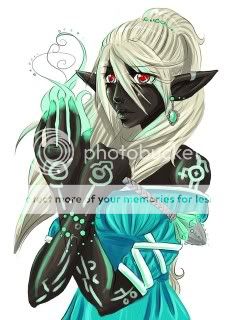 C Class C Class Enchantment spells focus on tricking the mind. They effectively manipulate emotions, perceptions, and even thoughts, penetrating the most vulnerable parts of a creature's being. Specialists in this school call themselves enchanters,and they subscribe to the philosophy that your most valued friends are those you make. Those who disparage the enchantment school reject its ways as a perversion of free will, but enchanters usually win them over, much to the surprise of anybody who knew the outspoken parties before their change of mind. For an enchanter, controlling the actions of another creature, particularly an influential one, is akin to guiding fate. Enchanters regard domination of the mind as the ultimate form of magical power. They realize that their field of magic won't change day to night, but it can alter the course of history, which is far more enduring. Those strong enough to resist such mental coercion might speak against the social corruption an enchanter can seed into a community. The enchanter blithely agrees, all the while manipulating politics to secure his or her position of influence. Philosophically, enchanters oppose the evocation school. The blunt nature of evocation spells is counterproductive to the finesse required by their clandestine spells. Since enchanters are concerned with blending in without being overtly noticed, necromancy is summarily rejected because of the stigma it attracts. Finally, conjuration serves little purpose to the enchanter, who prefers to command people of influence rather than mindless soldierlike creatures. Abjuration C Class By its nature, an abjuration spell interferes with something else. Whether it blocks, banishes, protects, or rescues, an abjuration spell is dedicated to preventing or ending some other event or effect. Specialists in this school call themselves abjurers, and they subscribe to the philosophy that an ounce of prevention is worth a pound of cure. The school's detractors refer to abjuration derisively as the school of denial or even the school of undoing, but abjurers contend that the power to unmake something (particularly another magical effect) represents the ultimate power over that thing. By extension, then, they hold abjuration as the most powerful school of magic. The existence of abjuration spells reflects the universe's desire for equilibrium, the school's devotees claim. For every object, force, or effect, there exists a source of opposition that negates it. Those who reject this theory claim simply that abjuration spells result from long magical research driven by the desire to resist (or reverse) change. Abjurations aren't about universal balance; they're just about maintaining the status quo. Philosophically, abjurers are most likely to come into conflict with illusionists. After all, abjuration deals with real forces, not ephemeral tricks and facades. Since many abjuration spells deal with protecting or ending harmful ongoing effects, abjurers tend to be natural rivals of enchanters (whose magic depends on such effects). Evokers, with their love of loud and flashy magic, also rub abjurers the wrong way. Conjuration C Class A conjuration spell creates or summons a real object or creature. The effect could appear in the spellcaster's hand, arrive from another plane of existence, or take shape in front of her. Specialists in this school call themselves conjurers, and they subscribe to the philosophy that two birds in the hand are worth four in the bush. Critics of the conjuration school deride this discipline as outright theft and enslavement, but conjurers feel that the objects they materialize and the creatures they summon are composed of latent energy waiting to be formed by their will. They like to imagine that through spellcasting, they take control of the fundamental material of reality. Conjurers believe that their spells are drawn from the leftover energy that created the universe. As such, their spells do not steal from the world around them, but instead draw from an ever-expanding force of creation that is still spawning life in its wake. Those who oppose this theory accuse conjurers of weakening the fabric of reality, slowly draining off imperceptible amounts of matter to fuel their spells. Philosophically, conjurers stand in opposition to the school of evocation, which focuses on creating something from nothing. Conjurers find evocation spells superficial and devoid of possibility, since they lack meaningful substance. Other conjurers consider enchantment spells too limited and unreliable for regular use. Likewise, conjurers regard illusion spells as distasteful, preferring to work only with what is real. Transmutation R Class A transmutation spell modifies energy and matter. The effect could alter a creature's shape, boost mental or physical qualities, or change the way something interacts with the world. Specialists in this school call themselves transmuters, and they subscribe to the philosophy that if life gives you an orange, make lemonade. Adversaries of the transmutation school claim that only gods have the right to change creation, but transmuters feel that if something can be retasked to serve a more meaningful purpose, the amount of change is irrelevant. They claim that any hurdle, no matter how daunting, can be solved by changing it into something harmless. Transmuters attribute the strength and variety of their spells to a belief that all things in the universe must inevitably change into something else. They merely accelerate that ongoing evolutionary momentum to suit their needs. Those who deride this theory as romantic nonsense claim instead that transmutation places an unnecessary strain on the universe, because as objects are continually modified, new and unpredictable aberrations begin to take form of their own accord. Philosophically, transmutation is opposed to the school of conjuration. Rather than working with existing materials, conjuration creates or summons new materials. Evocation is similar in this regard, in that both schools create effects instead of modifying what is on hand. Necromancy and transmutation are complementary schools, since both share the same view of using whatever is available. Whether alive, dead, or inanimate, the raw materials can be altered to become something more.
|
 |
 |
|
|
|
|
|
|
|
|
|
|
|
|
|
|
|
 Posted: Thu Feb 17, 2011 2:34 am Posted: Thu Feb 17, 2011 2:34 am
Yathrin
The Priest/ess Class It should be noted that while the descriptions below may speak about the Good aligned aspect of this class. The Drow are typically evil. Therefore it is the evil aspect of these classes that you pay more note to. Still, in the case of Legendary Classes, the option to be a Good aligned Priest/ess is available. Cleric/Priestess  C Class C Class The handiwork of the gods is everywhere—in places of natural beauty, in mighty crusades, in soaring temples, and in the hearts of worshipers. Like people, gods run the gamut from benevolent to malicious, reserved to intrusive, simple to inscrutable. The gods, however, work mostly through intermediaries—their clerics. Good clerics heal, protect, and avenge. Evil clerics pillage, destroy, and sabotage. A cleric uses the power of his god to make his god’s will manifest. And if a cleric uses his god’s power to improve his own lot, that’s to be expected, too. Ideally, a cleric’s adventures support his god’s causes, at least in a general way. A good cleric, for example, helps those in need. If, through noble acts, he can improve the reputation to his god or temple, that’s even better. An evil cleric seeks to increase his own power and that of his deity, so that others will respect and fear both. Clerics sometimes receive orders, or at least suggestions, from their ecclesiastical superiors, directing them to undertake missions for the church. The clerics and their companions are compensated fairly for these missions, and the church may be especially generous with the casting of needed spells or divine magic items as payment. Of course, clerics are people, too, and they may have any or all the more common motivations for adventuring. Clerics are masters of divine magic, which is especially good at healing. Even an inexperienced cleric can bring people back from the brink of death, and an experienced cleric can bring back people who have crossed over that brink. As channelers of divine energy, clerics can affect undead creatures. A good cleric can turn away or even destroy undead; an evil cleric can bring undead under his control. Clerics have some combat training. They can use simple weapons, and they are trained in the use of armor, since armor does not interfere with divine spells the way it does with arcane spells. Druid  L Class L Class The fury of a storm, the gentle strength of the morning sun, the cunning of the fox, the power of the bear—all these and more are at the druid’s command. The druid however, claims no mastery over nature. That claim, she says, is the empty boast of a city dweller. The druid gains her power not by ruling nature but by being at one with it. To trespassers in a druid’s sacred grove, and to those who feel her wrath, the distinction is overly fine. Druids adventure to gain knowledge (especially about animals and plants unfamiliar to them) and power. Sometimes, their superiors call on their services. Druids may also bring their power to bear against those who threaten what they love, which more often includes ancient stands of trees or trackless mountains than people. While druids accept that which is horrific or cruel in nature, they hate that which is unnatural, including aberrations (such as beholders and carrion crawlers) and undead (such as zombies and vampires). Druids sometimes lead raids against such creatures, especially when they encroach on the druids’ territory. Druids cast divine spells much the same way clerics do, though most get their spells from the power of nature rather than from deities. Their spells are oriented toward nature and animals. In addition to spells, druids gain an increasing array of magical powers, including the ability to take the shapes of animals, as they advance in level. The armor of a druid are restricted by traditional oaths to the items noted in Weapon and Armor proficiency (below),All other armor is prohibited. Though a druid could learn to wear full plate, putting it on would violate her oath and suppress her druidic powers. Druids avoid carrying much worked metal with them because it interferes with the pure and primal nature that they attempt to embody. Paladin 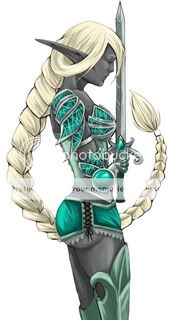 R Class R Class Evil Paladins are the fanatical zealots serving evil deities as crusaders, commanders, and champions. They are the profane standard-bearers, the battle-line breakers, and the unforgiving masters of fell armies. Evil Paladins serve their deity by spreading their dogma and mercilessly slaying those who refuse to convert. The evil of an evil paladin is an unequivocal force that shakes even the mightiest warriors of goodness. Evil Paladins adventuring alone or with a small group are typically attempting to become strong enough to lead the armies of his deity. Adventuring provides an evil paladin with an opportunity to suffuse his deity's will throughout the land as well as overcome challenges and defeat the opponents of his agenda. Some may be on profane quests offered by his order. Evil Paladins frequently refer to their adventures as crusades. Evil -Paladins are carefully crafted leaders. They are brutal and unrelenting, placing their every resource on the line to achieve a goal. Evil Paladins exist to bring glory to their deity first, and then to their Order and self (though many scheme for themselves above their Order).
|
 |
 |
|
|
|
|
|
|
|
|
|
|
|
|
 Posted: Thu Feb 17, 2011 2:37 am Posted: Thu Feb 17, 2011 2:37 am
Specialty Class
The Legendary Options At times it comes to be noted that a particular class is requested that is not currently covered in the main bulk above. In these cases, after a bit of review and consideration, certain ones are allowed to be passed on to custom created characters. Here is where the Specialty Classes shall be listed. Due to their unique nature, a Class listed below is not available for other customs. These are classes that have significance in their rarity, and we wish to allow the individual who possesses this class to retain their thunder, as it were. If you have a Custom Character created, and your class is -not- listed above. You may request your class be listed here. If your class is not listed here, then that means you are fine with someone else choosing the same class as you. Apostle of Peace In a world where conflict usually means violence, where good and evil meet regularly on the field of battle, where might too often makes right and power is measured in gold peaces, the apostle of peace is a lone voice crying in the wilderness, calling for a change of heart. Having completely forsworn violence in any form, the apostle of peace is an advocate for nonviolent resolution of conflict. He is a powerful font of divine magic, but his spells are all aimed toward healing, calming hostility, and aiding his allies. Members of all classes can qualify to become apostles of peace, though barbarians, fighters, and rogues have difficulty meeting the skill prerequisites and are usually too oriented toward martial exploits to be interested. Clerics, bards, and druids often develop pacifistic philosophies and gravitate toward this class, but any character can experience a conversion of sorts and become an apostle of peace.
|
 |
 |
|
|
|
|
|
|
|
|
|
|
|
|
|
|
|
 Posted: Thu Feb 17, 2011 2:39 am Posted: Thu Feb 17, 2011 2:39 am
Prestige Classes A Prestige Class is available to characters who reach their final stage. Choosing to take a Prestige Class means you can not make your character a Cross Class character. You must fulfill the base requirements in order to select a Prestige Class. A Warrior can not select a Mage type Prestige Class for example. Arachnomancer Requirement: Spellcaster (Resource: Drow of the Underdark) By discarding the religious traditions dominating drow culture, the arachnomancer finds a different way to serve the Weaver of Webs. Through careful study, the arachnomancer comes to understand spiders in a unique and disturbing way, developing a rapport with the vermin. It doesn’t take long for the arachnomancer to shape his magical studies to awaken the Spider Queen’s blessings within himself, allowing him to assume the form of a monstrous spider. To many, arachnomancers are expressions of the Flesh-Carver’s influence on the mortal world, but the fact is that only masters of arcane magic, not divine, can learn the techniques necessary to enter this class. Arachnomancers slowly absorb the characteristics of vermin as they advance until they transcend their ordinary form, in the process discovering the power to assume the form of a monstrous spider. Their studies awaken certain verminlike qualities within them, leaving these characters forever changed. The greatest strength you have as an arachnomancer is the ability to assume the form of a monstrous spider. Although this ability greatly enhances your combat prowess, you are no more durable in your spider shape than you were in your original form. However, you gain the extraordinary abilities of your new form, including a poisonous bite and the ability to spin webs. Even if you don’t fall back on your spider shape ability, you still have a number of assets. The fi rst level you take in this class signifi cantly improves your spellcasting options by granting you the bonus spells of the Spider domain. You sacrifice some of your spellcasting potential, but you still have a large enough array of spells to augment your other arachnomancer features and to eliminate foes. Cavestalker Requirement: Ranger, Druid, Thief (Resource: Drow of the Underdark) The Underdark’s most dangerous predators are not its horrific monstrosities, crawling and festering in the darkest of grottoes. Rather, they are the deadly cavestalkers, moving effortlessly through a jungle of living rock—and none are as much at home in these caverns as the drow. Just as a surface ranger feels at peace in the heart of a virgin forest, so too is a cavestalker is at home in the wilds of the Underdark. Yet even in his most familiar environment, he is aware of the ever-present danger that surrounds him. It is in the task of surviving this endless peril that he finds peace away from so-called “civilized folk. Rangers and druids are natural candidates for the cavestalker class. Underdark races that choose the path of the druid or ranger find little use for the abilities of those classes that are attuned to the wilderness of the surface. The cavestalker class augments and hones those abilities, making them more suitable for use in the endless night and providing a true advantage for those that live away from the light. Rogues occasionally become cavestalkers, since their high skill point allotment allows them to achieve the requirements more easily than other classes. Other classes might enjoy the benefits of becoming a cavestalker, but would likely find meeting the requirements to be prohibitive. Regardless of class, only individuals who have natural darkvision can achieve the affinity with the lightless depths necessary to become a cavestalker. As they advance in the class, cavestalkers become more familiar with the Underdark’s natural elements. In addition, any abilities they have from the ranger or druid classes become attuned to their subterranean environment. As a cavestalker, you nurture a close, almost mystical connection to the deadly terrain of the Underdark. To you, the lightless tunnels are not friends, exactly, but perhaps well-respected adversaries. Danger is always present, yet you understand it and even find a certain succor in living alongside it. The call of the wild is a very different thing in the Underdark from what it is on the surface, but its allure is no less enticing. Whereas on the surface a character might enter the remote reaches of nature to fi nd solitude or peace, in the Underdark he typically does it for survival. Perhaps the most dangerous location in the Underdark is on the “civilized” streets of a drow city: an environment rife with political intrigue, betrayal, and assassination. To escape these noxious environs, you sought refuge in the surrounding tunnels where even the foulest elements of drow society fear to tread. By gaining an intimate knowledge of this hazardous realm, you buy some breathing room and security from the knives of your kin without abandoning all the advantages that drow society has to offer. As your cavestalker abilities increase, you find the Underdark a more and more inviting place (if a place of such constant peril can be called inviting). You use your skills to establish safe havens for yourself or to gain employment opportunities— perhaps guiding the rich and the powerful to distant, dangerous locations. You also find that continuing to advance as a ranger or druid augments your already impressive abilities in the Underdark’s deepest caverns. Demon Binder Requirement: Spellcaster (Resource: Drow of the Underdark) The demonbinder draws the essence of demons into herself to acquire their power. Such acts are forbidden, and doing so condemns the mortal to eternity in the deepest pits of the Abyss. However, the demonbinder cares little for her fate, being wholly concerned with power in the here and now. It is from this doom that she is able to invest herself with the power of fiends, and the farther she travels down the road of corruption, the more potent are the demons she binds. By becoming a demonbinder, you sacrifice your immortal soul for the instant power granted by the Abyss. You draw demonic agencies inside yourself, triggering a vile transformation that bestows not only a sampling of a fi end’s power, but also a resemblance to that f end. Constant exposure to these creatures leaves a stain on your soul so foul that no act of restitution will ever cleanse it. For obvious reasons, most demonbinders find little acceptance in most civilized lands and are forced to make do in remote places: dark lands fi lled with goblinoids, giants, and other creatures that care little for the interests of one depraved mortal. This, however, is not the case with the drow. Thanks to Lolth’s association with the Abyss, particularly with regard to her personal domain (the Demonweb Pits), female demonbinders are valued members of the Spider Queen’s clergy. Called the Daughters of the Demon, they treat regularly with fiends. Lending special insights into the nature of demons, they aid priestesses in a particularly terrifying ritual—one in which these otherworldly beings are called up to take part in depraved couplings, hoping to gain the favor of the Queen of Spiders. The Abyss and the creatures that dwell within its endless depths contain enormous power that you have stolen and molded to serve your purposes. You turned to the forbidden knowledge of the demonologists, scouring tomes of the most profane knowledge to unlock the secrets of demonbinding. You learned how to open yourself to these spirits and invite them to reside within you. The depth of their wickedness shocked you at first, but each time you bound one, you found your reluctance slipping away until the process felt almost natural. Unless you are ensconced in a church of Lolth, odds are that you are an exile, cast out of society for your terrible arts. You might surround yourself with minions for the protection they afford. If you are not an exile, and you are female, then you are a part of the esteemed Daughters of the Demon, a coven of female drow warlocks who advise and support the priestesses, helping them to exert their absolute control over the community. Though most of your time is spent in these endeavors, you occasionally use your magical talents to thwart your most ambitious competitors. Dread Fang of Lloth Requirement: Warrior (Resource: Drow of the Underdark) The dread fangs of Lolth are elite soldiers who fight for the drow matriarchs. They are a visible manifestation of the theocratic power that governs the dark elves, and their appearance elicits fear in almost all who behold them. Dread fangs of Lolth answer only to the clergy, but they work alongside the mysterious eyes of Lolth from time to time. Dread fangs of Lolth are shrewd warriors who specialize in the element of surprise. From the outset, they are granted blessings from their goddess that set them apart from other warriors. As they gain levels, they develop a number of techniques that help them make swift and deadly attacks. As a dread fang of Lolth, you enforce the will of the priestesses. The goddess favors you, filling your mind with her whispers and mutterings. Most times, it is a constant, almost maddening noise, but you have learned to pick out some wisdom from her litany—insights that make you a better warrior. You are more than just a soldier, though. You are part of an elite fighting force that protects and furthers the Spider Queen’s interests. As a group, you and your fellow fangs protect temples, priestesses, and the city, and occasionally undertake important missions for the clerics of Lolth. You take your responsibilities seriously and are loyal to a fault. Becoming a dread fang of Lolth was no easy task. It involved endless hours of training, including the extensive study of numerous fighting techniques as well as in-depth religious indoctrination. For years, you honed your abilities, improving upon your already formidable talents. But the priestesses waited for a sign of greater ability, and then it came: The mark of Lolth’s favor began as a faint voice, the slightest whisper, something you might have imagined. But it soon became far more insistent. It distracted you and pushed you to the brink of madness, but somehow you resisted—and eventually embraced the whispering, knowing that it was the voice of the goddess herself. And thus, you were welcomed into the ranks of the fangs. You are a chosen servant of Lolth and, by virtue of your status, few drow dare cross your path. The priestesses supply you with your basic equipment, as well as housing, clothing, and the necessary supplies to survive. In addition, you have an easy time finding trainers and mentors who can help you refine your craft. The dread fangs of Lolth have a presence in nearly every drow city. Wherever there are priestesses of the Spider Queen, fangs are not far. As the enforcement arm of the church, the fangs ensure that the wishes of the priestesses are fulfilled and their enemies destroyed. The clerics assign fangs to the eyes of Lolth. Under the command of these operatives, the fangs provide the muscle to ensure a successful mission. Eyes and fangs work exceptionally well together, their abilities complementing each other. When so paired, they can be a nearly unstoppable force. Candidates are always carefully screened before being invited to join the fangs, since the priestesses cannot afford to compromise the integrity of the organization with dissent or treasonous thoughts. They pick talented males (and rarely females) who are unswervingly loyal to the Spider Queen. Candidates endure a difficult period of training to alter their personalities and correct their conflicting loyalties until a single-minded warrior remains. Of these, only the ones who hear the voice of Lolth are allowed to become full-fledged members. Eye of Lloth Requirement: Priestess, Wizard, Rouge (Resource: Drow of the Underdark) The eyes of Lolth are stealthy servants and watchers faithful to the Church of Lolth. They observe activity in the lands controlled by the matriarchs and report their findings back to the houses. It falls to the eyes of Lolth to lead forces of dread fangs of Lolth and other drow to capture enemies and bring them back to the temples for interrogation. They are the secret police—and they are everywhere. You pride yourself on your vigilance and pay attention to every smallest detail, no matter how inconsequential. It is because of your observations that you have worth in the eyes of the matriarchs, and as long as you have worth, you have some degree of protection from the awful torments they inflict on those who have angered them. The eyes of Lolth are an insidious organization, infesting every level of drow society. As a member, you live a double life, posing as a priestess or as a common citizen in one of the city’s ghettos. It’s vital that you retain your cover, since it allows you to keep track of the various undercurrents that define the tumultuous atmosphere of drow culture. The church of Lolth aggressively recruits new eyes of Lolth. In fact, eyes are always under orders to watch for suitable candidates to bring into the organization. In all likelihood, this was your first introduction to the eyes. Of course, it wasn’t as if you had a choice about joining. Refusing an invitation is tantamount to accepting a death sentence. As an eye of Lolth, it is your responsibility to gather information about your fellow drow, to notice trends and developments within your culture, and to anticipate upheavals. One might expect the priestesses to take a more active role in monitoring their cities, but their important enemies protect their privacy with a variety of wards. It falls to you to undertake these dangerous missions, to get close to the movers and shakers of the underworld and learn what you can. As members of the secret police, eyes of Lolth have access to extensive stores of information, compiled by various agents working in the field. Most entries are dossiers on agitators, important slaves, and the members of the mighty households. To the common drow, the existence of the eyes is only the subject of conjecture. Few drow have ever knowingly met an eye of Lolth, even though most suspect that they’ve encountered at least one during the course of their lives. The extent of the eyes’ power varies from city to city. In some places, they are a force rivaling even the Spider Queen’s church and are no longer subject to the whims of her clerics. In others, they are small, disorganized, and subjugated by the subversive elements in the cities. Regardless, those who know about the eyes invariably fear them. In most cases, the eyes work directly for the priestesses, filing regular reports and receiving assignments from the church. Eyes are loners, since too many operatives in one place can compromise a mission. Certain targets require a greater investment of resources, however, and in these cases groups of four or more eyes might monitor the same mark. The eyes are closely affiliated with the dread fangs of Lolth. Although some rivalry exists between the two groups, they work together to handle dangerous jobs. Fangs, as the enforcers and elite soldiers, do the majority of the fighting. The eyes direct the combat, lending support where needed. Insidious Corrupter Requirement: Spellcaster (Resource: Drow of the Underdark) The insidious corrupter is a manipulator, a devious and sinister villain who lures individuals to their dooms. Armed with his silver tongue and his keen wit, few can resist his suggestions, and his victims meet dreadful fates either as sacrifices on the high priestesses’ bloody altars or as slaves in the endless tunnels of the Underdark. Nearly all corrupters are arcane spellcasters, since candidates must master the dominate person spell. Insidious corrupters are unique to the drow, and most of them are bards or sorcerers who establish a strong foundation of spellcasting abilities prior to advancing in this prestige class. Domination is your trade. You derive pleasure from manipulating others, from bending them to your will and making them your creatures. To this end, you have magnified your already impressive powers to specialize in controlling other beings. The more you influence them, and the more you instruct them to behave as you desire, the more they become your slaves. You didn’t choose to become an insidious corrupter; you were born to it. Your entire life has been spent manipulating, deceiving, and creating situations that best benefit you. This ability only grew more pronounced when you studied magic, for therein lay the secrets of true mastery. You discovered that you could achieve far more with well-placed spells than you ever could with cunning wit and careful words. Even better, you learned to marry those two techniques into one extremely effective method—the claws of influence ability, which changed your life forever. Although when directly confronted you are nearly impossible to refuse, your powerful personality loses its force when you are separated from your subjects. Those who grow wise to your nature and abilities resent you—and might even hate you. Thus, you rarely remain overlong in your drow city, leaving to seek your fortunes on the surface. There you work carefully to serve the matriarchs, sending expeditions into traps that allow the dark elves to harvest the would-be adventurers as slaves. At home in a large organization, an insidious corrupter wastes little time climbing the ranks, forcing his way to the top to best control the institution. He manages this with a surgical precision, carefully murdering those who prove too difficult to control and bending the rest to his will. It doesn’t matter which organization he joins, as long as he benefits by doing so. The most likely target for infestation by an insidious corrupter is a group whose primary function is exploration and acquisition. Posing as a candidate, the insidious corrupter meets whatever criteria are required by the organization—or he fakes the relevant abilities by the use of the Disguise skill or other means—until he is accepted by the group and made a full-fledged member. Once there, he is careful to keep the organization’s purpose and function in mind, secretly replacing key members with those loyal to himself. It’s just a matter of time before he takes control, at which point it’s far too late to stop him.
|
 |
 |
|
|
|
|
|
|
|
|
 |
|
|
|
|
|
|




 C Class The questing knight, the conquering overlord, the king’s champion, the elite foot soldier, the hardened mercenary, and the bandit king— all are fighters. Fighters can be stalwart defenders of those in need, cruel marauders, or gutsy adventurers. Some are among the land’s best souls, willing to face death for the greater good. Others are among the worst, with no qualms about killing for private gain, or even for sport. Fighters who are not actively adventuring may be soldiers, guards, bodyguards, champions, or criminal enforcers.
C Class The questing knight, the conquering overlord, the king’s champion, the elite foot soldier, the hardened mercenary, and the bandit king— all are fighters. Fighters can be stalwart defenders of those in need, cruel marauders, or gutsy adventurers. Some are among the land’s best souls, willing to face death for the greater good. Others are among the worst, with no qualms about killing for private gain, or even for sport. Fighters who are not actively adventuring may be soldiers, guards, bodyguards, champions, or criminal enforcers.  R ClassThese warriors are desensitized to the light of the surface world. Working under a female commander to conduct reconnaissance missions and organized attacks on the surface elves and any other surface creature that gets in their way. Surface Raiders fall into multiple categories for class. The one currently described here is one who makes up the bulk of the raiding army. Warrior Raiders are trained to be quick and effective in their assault. They are taught about the strangeness of the surface, and if they manage to survive a few years worth of trips above, they can become exceptional in their job.
R ClassThese warriors are desensitized to the light of the surface world. Working under a female commander to conduct reconnaissance missions and organized attacks on the surface elves and any other surface creature that gets in their way. Surface Raiders fall into multiple categories for class. The one currently described here is one who makes up the bulk of the raiding army. Warrior Raiders are trained to be quick and effective in their assault. They are taught about the strangeness of the surface, and if they manage to survive a few years worth of trips above, they can become exceptional in their job. C ClassLocal lords call upon bounty hunters to capture criminals that live or have traveled beyond their reach or criminals that outclass the knights or soldiers in the lords employ. Closer to the frontier, the bounty hunter might be the only law capable of bringing dangerous criminals to justice. Those who hire bounty hunters both like them, and scorn them.
C ClassLocal lords call upon bounty hunters to capture criminals that live or have traveled beyond their reach or criminals that outclass the knights or soldiers in the lords employ. Closer to the frontier, the bounty hunter might be the only law capable of bringing dangerous criminals to justice. Those who hire bounty hunters both like them, and scorn them. C Class Rogues share little in common with each other. Some are stealthy thieves. Others are silver-tongued tricksters. Still others are scouts, infiltrators, spies, diplomats, or thugs. What they share is versatility, adaptability, and resourcefulness. In general, rogues are skilled at getting what others don’t want them to get: entrance into a locked treasure vault, safe passage past a deadly trap, secret battle plans, a guard’s trust, or some random person’s pocket money.
C Class Rogues share little in common with each other. Some are stealthy thieves. Others are silver-tongued tricksters. Still others are scouts, infiltrators, spies, diplomats, or thugs. What they share is versatility, adaptability, and resourcefulness. In general, rogues are skilled at getting what others don’t want them to get: entrance into a locked treasure vault, safe passage past a deadly trap, secret battle plans, a guard’s trust, or some random person’s pocket money. R ClassMost surface raiders must dress in thick robes with veils or protective goggles to guard against the light of the surface world. They either follow the Surface Raider armies to scavenge sellable goods or conduct surprise robberies on unsuspecting surface villages.
R ClassMost surface raiders must dress in thick robes with veils or protective goggles to guard against the light of the surface world. They either follow the Surface Raider armies to scavenge sellable goods or conduct surprise robberies on unsuspecting surface villages. C ClassBright and colorful or shadowy with a crooked smile, those are the typical descriptions of a Con Artist. Many specialize in a variety of skills, each honed for one motto: You can fool some of the people, all of the time.
C ClassBright and colorful or shadowy with a crooked smile, those are the typical descriptions of a Con Artist. Many specialize in a variety of skills, each honed for one motto: You can fool some of the people, all of the time. C ClassA spy is a thief specializing in information. Any society has secrets, and there are always people who want to find these secrets out. A spy gets the information and finds uses for it, selling it, using it for blackmail, or releasing it to the public. You could say that the spy is a rogue specializing in opening hearts and minds instead of locks.
C ClassA spy is a thief specializing in information. Any society has secrets, and there are always people who want to find these secrets out. A spy gets the information and finds uses for it, selling it, using it for blackmail, or releasing it to the public. You could say that the spy is a rogue specializing in opening hearts and minds instead of locks. C Class Assassins kill instantly and in secret, their favorite weapons being the dagger and the poisoned dart. They will persue any target, for the right price that is. Some assassins may be found in the permanent employ of a House. After all, every good Matron has at least one trained assassin on hand for those troublesome upstarts pestering them.
C Class Assassins kill instantly and in secret, their favorite weapons being the dagger and the poisoned dart. They will persue any target, for the right price that is. Some assassins may be found in the permanent employ of a House. After all, every good Matron has at least one trained assassin on hand for those troublesome upstarts pestering them. C ClassYour training has focused on the use of poison, the hidden art of death, immobilization, pain, sleep,
C ClassYour training has focused on the use of poison, the hidden art of death, immobilization, pain, sleep, C Class An evocation spell creates an effect out of thin air. The effect could blind its targets with searing light, immolate them with explosive fire, or shock them with electrical current. Specialists in this school call themselves evokers, and they subscribe to the philosophy that the best defense is a strong offense. Those who oppose the school of evocation cite the collateral damage of these spells, but evokers are quick to assure any concerned party that their spells are either carefully timed or highly precise. In truth, evokers are almost fatalistically drawn to the limitless raw magical power of their spells, oblivious to the inherent danger.
C Class An evocation spell creates an effect out of thin air. The effect could blind its targets with searing light, immolate them with explosive fire, or shock them with electrical current. Specialists in this school call themselves evokers, and they subscribe to the philosophy that the best defense is a strong offense. Those who oppose the school of evocation cite the collateral damage of these spells, but evokers are quick to assure any concerned party that their spells are either carefully timed or highly precise. In truth, evokers are almost fatalistically drawn to the limitless raw magical power of their spells, oblivious to the inherent danger. C Class Necromancy spells hold dominion over life and death. Their effects can drain the stamina out of an opponent's body, exert control over the undead, or instill paralyzing fear in a creature's mind. Specialists in this school call themselves necromancers, and they subscribe to the philosophy of waste not, want not. Detractors of the school condemn necromancers' practices as abhorrent and disrespectful to the dead, but necromancers defend their art on the premise that the dead care very little for their bodies, especially if they can be put to good use. Controlling such bodies, however, is secondary to controlling life.
C Class Necromancy spells hold dominion over life and death. Their effects can drain the stamina out of an opponent's body, exert control over the undead, or instill paralyzing fear in a creature's mind. Specialists in this school call themselves necromancers, and they subscribe to the philosophy of waste not, want not. Detractors of the school condemn necromancers' practices as abhorrent and disrespectful to the dead, but necromancers defend their art on the premise that the dead care very little for their bodies, especially if they can be put to good use. Controlling such bodies, however, is secondary to controlling life. C Class An illusion spell creates a false impression that targets the senses. The effect could hide your presence, summon a target's greatest fear, or manifest a visage limited only by your creativity.
C Class An illusion spell creates a false impression that targets the senses. The effect could hide your presence, summon a target's greatest fear, or manifest a visage limited only by your creativity. C Class Enchantment spells focus on tricking the mind. They effectively manipulate emotions, perceptions, and even thoughts, penetrating the most vulnerable parts of a creature's being. Specialists in this school call themselves enchanters,and they subscribe to the philosophy that your most valued friends are those you make. Those who disparage the enchantment school reject its ways as a perversion of free will, but enchanters usually win them over, much to the surprise of anybody who knew the outspoken parties before their change of mind. For an enchanter, controlling the actions of another creature, particularly an influential one, is akin to guiding fate.
C Class Enchantment spells focus on tricking the mind. They effectively manipulate emotions, perceptions, and even thoughts, penetrating the most vulnerable parts of a creature's being. Specialists in this school call themselves enchanters,and they subscribe to the philosophy that your most valued friends are those you make. Those who disparage the enchantment school reject its ways as a perversion of free will, but enchanters usually win them over, much to the surprise of anybody who knew the outspoken parties before their change of mind. For an enchanter, controlling the actions of another creature, particularly an influential one, is akin to guiding fate. C Class The handiwork of the gods is everywhere—in places of natural beauty, in mighty crusades, in soaring temples, and in the hearts of worshipers. Like people, gods run the gamut from benevolent to malicious, reserved to intrusive, simple to inscrutable. The gods, however, work mostly through intermediaries—their clerics. Good clerics heal, protect, and avenge. Evil clerics pillage, destroy, and sabotage. A cleric uses the power of his god to make his god’s will manifest. And if a cleric uses his god’s power to improve his own lot, that’s to be expected, too.
C Class The handiwork of the gods is everywhere—in places of natural beauty, in mighty crusades, in soaring temples, and in the hearts of worshipers. Like people, gods run the gamut from benevolent to malicious, reserved to intrusive, simple to inscrutable. The gods, however, work mostly through intermediaries—their clerics. Good clerics heal, protect, and avenge. Evil clerics pillage, destroy, and sabotage. A cleric uses the power of his god to make his god’s will manifest. And if a cleric uses his god’s power to improve his own lot, that’s to be expected, too. L Class The fury of a storm, the gentle strength of the morning sun, the cunning of the fox, the power of the bear—all these and more are at the druid’s command. The druid however, claims no mastery over nature. That claim, she says, is the empty boast of a city dweller. The druid gains her power not by ruling nature but by being at one with it. To trespassers in a druid’s sacred grove, and to those who feel her wrath, the distinction is overly fine.
L Class The fury of a storm, the gentle strength of the morning sun, the cunning of the fox, the power of the bear—all these and more are at the druid’s command. The druid however, claims no mastery over nature. That claim, she says, is the empty boast of a city dweller. The druid gains her power not by ruling nature but by being at one with it. To trespassers in a druid’s sacred grove, and to those who feel her wrath, the distinction is overly fine. R Class Evil Paladins are the fanatical zealots serving evil deities as crusaders, commanders, and champions. They are the profane standard-bearers, the battle-line breakers, and the unforgiving masters of fell armies. Evil Paladins serve their deity by spreading their dogma and mercilessly slaying those who refuse to convert. The evil of an evil paladin is an unequivocal force that shakes even the mightiest warriors of goodness.
R Class Evil Paladins are the fanatical zealots serving evil deities as crusaders, commanders, and champions. They are the profane standard-bearers, the battle-line breakers, and the unforgiving masters of fell armies. Evil Paladins serve their deity by spreading their dogma and mercilessly slaying those who refuse to convert. The evil of an evil paladin is an unequivocal force that shakes even the mightiest warriors of goodness.